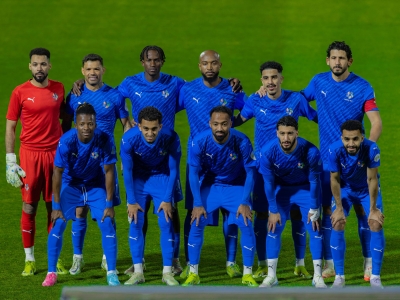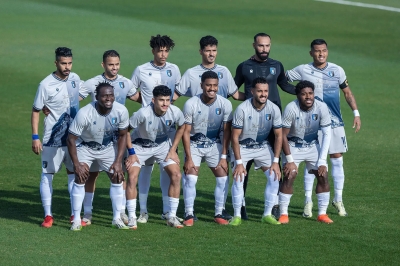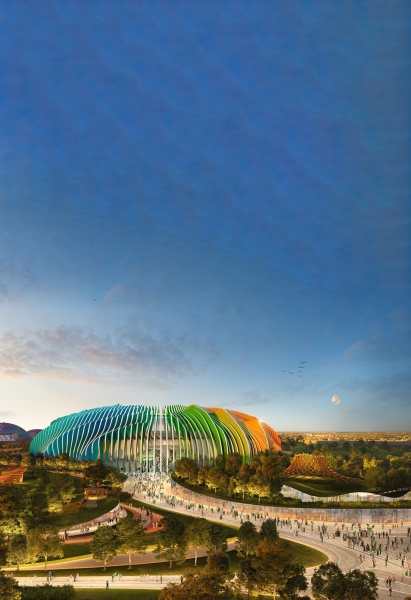
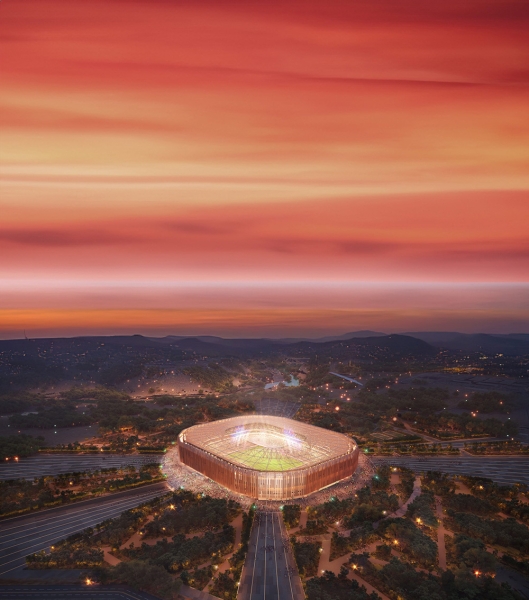
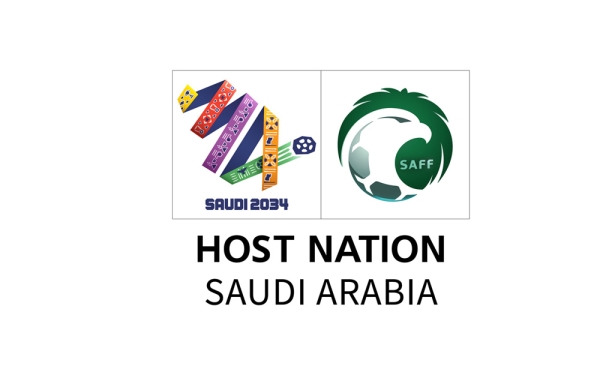
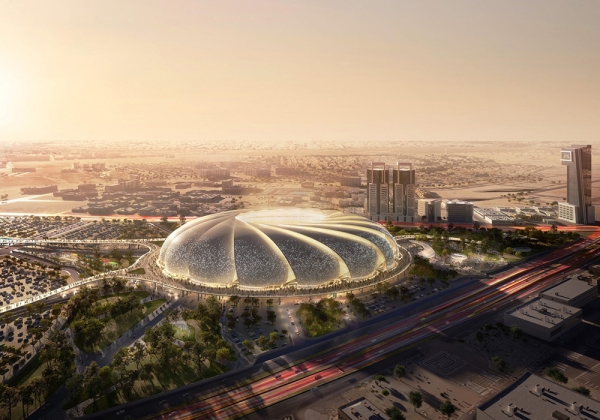
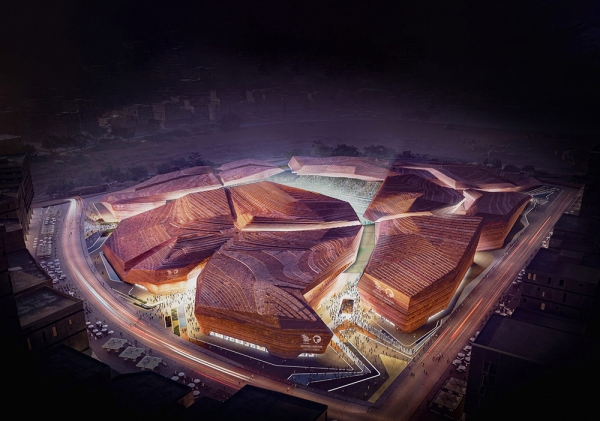
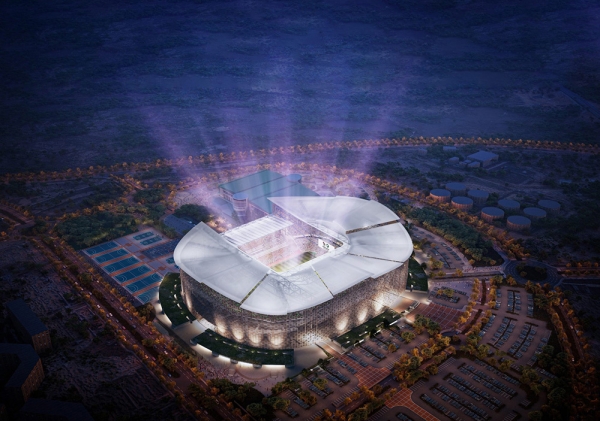
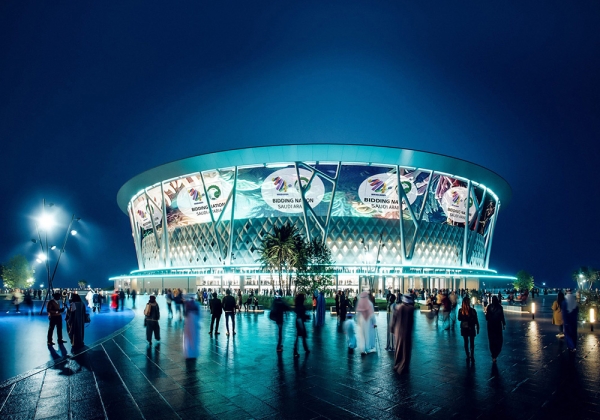
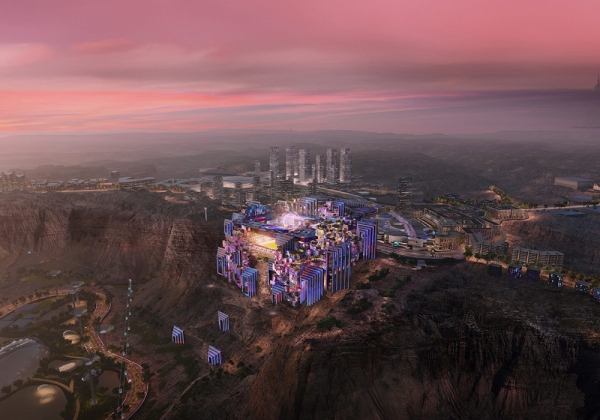
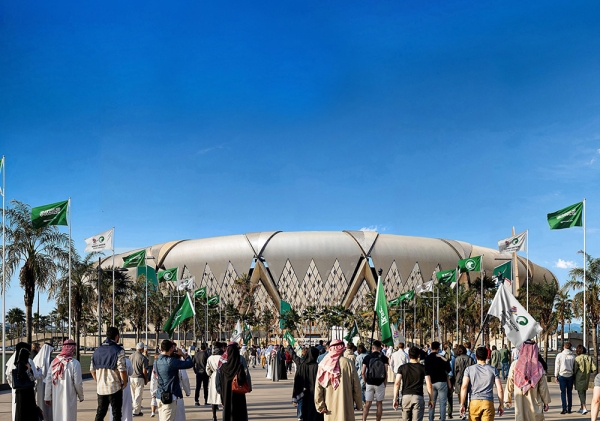
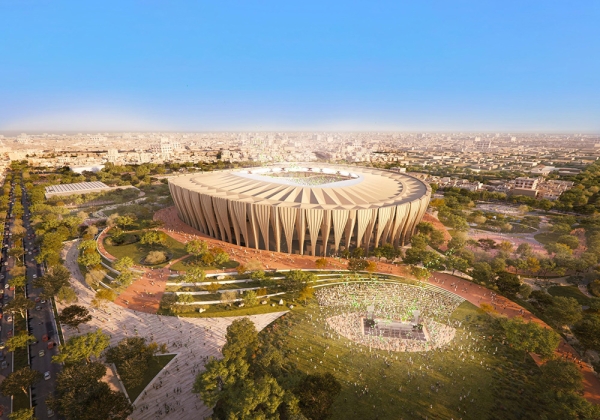
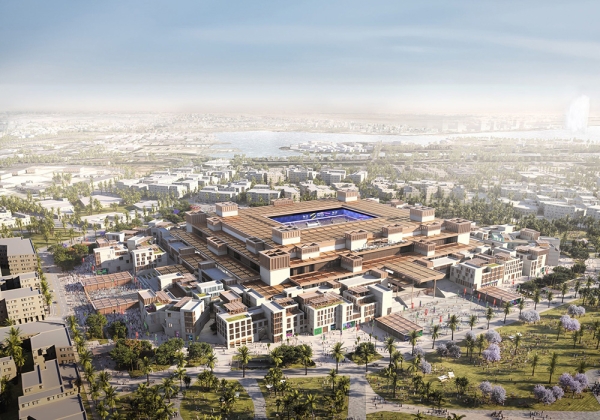
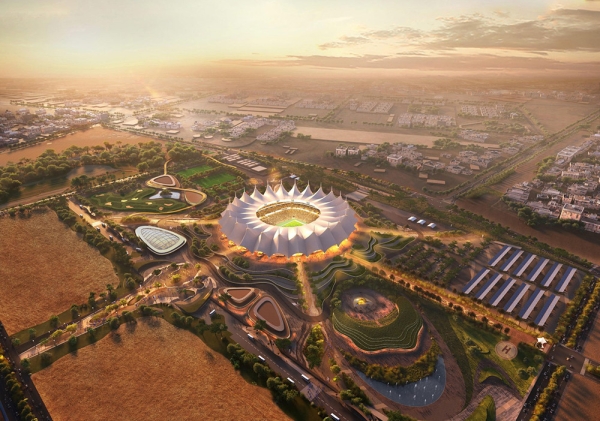
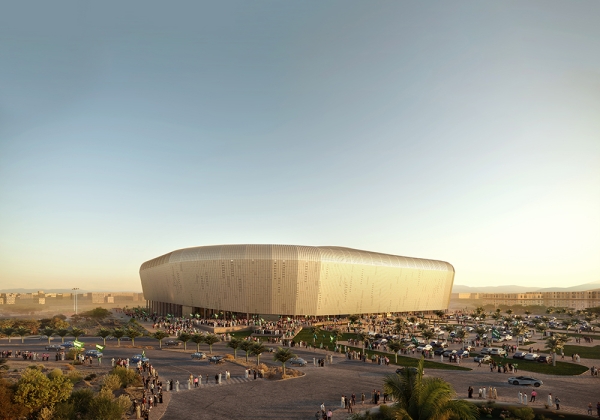
The 2034 World Cup will be the 25th edition of the FIFA World Cup, which will be hosted by the Kingdom of Saudi Arabia. This was officially announced by the International Federation of Association Football (FIFA) during an extraordinary meeting of its General Assembly. The Saudi bid received the highest rating in the history of World Cup hosting bids, with a FIFA score of 419.8 out of 500. This was after a comprehensive study of the Saudi bid, which included field visits to inspect the cities and projects included in the Saudi file.
The Saudi bid to host the 2034 World Cup is an extension of what Saudi Arabia has demonstrated over the past years leading up to the announcement of its candidacy, with developments in various fields, including sports. This is evident through its hosting of more than one hundred global sporting events across forty different sports. Additionally, it has established sports partnerships with over one hundred countries around the world.
The Kingdom aims for an exceptional hosting, as this will be the first edition to feature forty-eight teams organized in a single country, providing fans the opportunity to enjoy a unique celebratory tournament. The event will be hosted by five Saudi cities, in addition to ten supporting cities, with matches taking place in fifteen world-class international stadiums. There will be 134 training facilities and seventy-two training camp fields. Before the global event kicks off, 230,000 hotel rooms will be available, and sixteen international airports will welcome the tournament's guests, along with a number of trains and public transport buses.
Candidacy to Host the 2034 World Cup
On October 4, 2023, the Kingdom announced its intention to bid for hosting the 2034 World Cup, with a comprehensive plan through which the Saudi Football Federation aims to harness all available resources and capabilities to provide an unprecedented experience for football fans during this global event, supported by the endorsement of 130 football federations worldwide. Crown Prince and Prime Minister His Royal Highness Prince Mohammed Bin Salman Bin Abdulaziz confirmed that the Kingdom’s desire to host the 2034 World Cup reflects the comprehensive renaissance the country has achieved across all levels, making it a leadership center and an international hub for hosting major global events in various fields, with its economic capabilities and rich cultural and historical heritage. He further explained that the intention to host the event reaffirms the Kingdom’s clear and significant efforts in spreading messages of peace and love globally, with sport being one of its key faces. Sport serves as an important means of bringing together people from different races and cultures, which the Kingdom has consistently achieved across various fields, including the sports sector.
On July 29, 2024, the Crown Prince blessed the Saudi bid file to host the 2034 World Cup after completing the details and requirements for the bid, in preparation for its submission to FIFA in the French capital, Paris, by the official Saudi delegation.
Submission of the Bid File
On July 29, 2024, the Kingdom officially submitted its bid file to host the 2034 World Cup in the French capital, Paris, during a ceremony organized by FIFA. The submission was made by an official delegation led by the Minister of Sport, Chairman of the Saudi Olympic and Paralympic Committee, Prince Abdulaziz Bin Turki al-Faisal, along with the President of the Saudi Football Federation, Yasser al-Mishal, and the participation of two children from the regional training centers of the Saudi Football Federation.
Submitting the bid file is one of the stages of the bidding process, which began with the Kingdom announcing its intention to bid for hosting the 2034 World Cup. This was followed by official inspection visits from FIFA and a complete evaluation of the bid file, leading up to the official announcement of the host country for the 2034 World Cup on December 11, 2024.
The official identity of the 2034 World Cup
On March 1, 2024, the Saudi Football Federation launched the official identity for the Saudi bid to host the FIFA World Cup 2034, featuring the slogan (Growing Together.) The visual identity and slogan for the bid were unveiled, along with the official website 'Saudi2034bid.com'. The bid's logo reflects the transformation and growth journey that the Kingdom is experiencing, as one of the fastest and most developed growth stories in the world of football. It also highlights the anticipated positive impact of hosting the largest global sporting event, as the first edition of the FIFA World Cup to feature forty-eight teams and be hosted by a single country.
Reflection of the visual identity
The design of the visual identity for the bid file reflects the essence of the Kingdom's rich cultural heritage and its young, vibrant society. The bid's logo consists of several colorful strips adorned with symbols related to football. These strips are designed in the shape of the number '34', symbolizing the year the Kingdom aspires to host the 25th edition of this global tournament. The visual identity also mimics the geographical map of the Kingdom and incorporates five different colors, representing the diversity of Saudi society and the Kingdom’s landscapes. These colors include orange, symbolizing generosity and authenticity; green, reflecting the beauty of the green oases; red, inspired by the coral reefs of the Red Sea; lavender, representing the colors of the lavender flower; and yellow, embodying the dreams and ambitions of the Saudi people for a bright future. The bid video, filmed in various regions of the Kingdom with the participation of current and former football stars, showcases the great passion of the Saudi people for football, as well as the cultural heritage, historical legacy, and natural landscapes of the Kingdom.
The pillars of Saudi Arabia's Bid for the 2034 World Cup
The Saudi bid file includes three main pillars: 'Together to Develop Human Capacities,' 'Together to Develop Football,' and 'Together to Develop Communication Bridges.' The slogan 'Growing Together.' aims to highlight the bonds that unite the Kingdom and its people with the global football community in an extraordinary journey, seeking to build a better future for the sport.
Supporting Factors for Saudi Arabia's Organization of the 2034 World Cup
1- A new global center for sports.
2- A country experiencing significant development in football.
3- A young and vibrant society.
4- A proven track record of hosting major global football events.
5- A single host country with a strategic location.
The unit of Saudi Arabia's Bid File to Host the 2034 World Cup
The Saudi Football Federation established a special unit for the Saudi bid to host the 2034 World Cup, chaired by Hamad al-Belawi. This unit operates according to the requirements of FIFA and is responsible for meeting all the demands of FIFA. It aims to present a bid that reflects the development of Saudi sports and fulfills the trust granted to the Kingdom by more than 130 football federations worldwide, who have shown their support for the bid since the Kingdom announced its intention to bid.
The 2034 World Cup: An extraordinary tournament
The Kingdom aspires to host the first edition of the World Cup to feature forty-eight teams, all organized in a single country, providing fans with the opportunity to enjoy a unique celebratory tournament. Fans will be able to attend several matches in one day, across five host cities, thanks to the variety and abundance of accommodation options and an integrated transportation system, ensuring a thrilling football experience. During the tournament, visitors will have a unique opportunity to travel between cities and explore the diverse natural environments of the Kingdom, from mountain ranges to stunning beaches, major cities, and much more.
Global standards in the infrastructure of the 2034 World Cup cities
The Kingdom has revealed its plan to host the 2034 World Cup, which includes state-of-the-art stadiums designed to offer the best practical features, the highest levels of comfort, and exceptional experiences for visitors. All of the world-class stadiums are strategically located across the Kingdom and comply with all local and international standards, incorporating sustainability as a core principle in their design and implementation. Additionally, 134 training facilities contribute to providing the necessary support for players, teams, and referees, ensuring maximum comfort and easy access throughout the entire tournament.
Saudi cities hosting the 2034 World Cup
The bid submitted by the Kingdom to FIFA has identified five cities to host the 2034 World Cup finals: Riyadh, Jeddah, Al-Khobar, Abha, and Neom.
Riyadh
Riyadh, the capital of the Kingdom and one of its most vibrant and prosperous cities, is the largest in terms of area and population. It serves as the administrative and financial center of the Kingdom. The city is preparing to host global sporting events such as the 2027 AFC Asian Cup and the 2034 Asian Games. Riyadh will be ready for the World Cup with eight world-class stadiums: King Salman International Stadium, King Fahd International Stadium, Prince Mohammed Bin Salman Stadium, New Murabba Stadium, Roshn Stadium, King Saud University Stadium, Prince Faisal Bin Fahd Sports City, and South Riyadh Stadium. It is proposed that Riyadh, specifically King Salman International Stadium, will host the opening and final matches of the 2034 World Cup. Riyadh also boasts King Salman Park, the largest urban park in the world, and the expansive festival grounds in Qiddiya, which are proposed locations for the FIFA Fan Festival. Fans can access these sites through the Riyadh Metro, consisting of six lines, along with various other transportation options. Riyadh will also be ready for the event with 127,000 hotel units and fifty-four training facilities for the tournament.
Jeddah
Jeddah is the second-largest city in the Kingdom by area and is distinguished by its coastal location, as well as its prestigious status as a commercial hub. The city offers a unique blend of tradition and modernity, and it is home to a historic area known as 'al-Balad,' which is listed on UNESCO's World Heritage Sites. Jeddah will be ready for the 2034 World Cup with four world-class stadiums: King Abdullah Sports City 'The Jewel,' King Abdullah Economic City Stadium, Central Jeddah Stadium, and Qiddiya Coast Stadium. The city features an extensive bus network to enable fans to easily reach the proposed FIFA Fan Festival sites, al-Khuzama Park, and the Jeddah Waterfront. Jeddah will also be ready for the global event with 43,000 hotel units and thirty training facilities for the tournament.
Al-Khobar
Al-Khobar is a modern, revitalized city on the Arabian Gulf coast in the Eastern Province of the Kingdom, and it is an essential part of the region's urban center. Al-Khobar will be ready for the 2034 World Cup with a world-class stadium, the Aramco Stadium, which has a capacity of 46,000 spectators, 12 training facilities for the tournament, and 17,000 hotel units. In addition, an effective multimodal transportation network will support the transportation of fans to the proposed locations for the FIFA Fan Festival, King Abdullah Park, and King Fahd Park.
Abha
Abha is the administrative capital of the Aseer region in the southwest of Saudi Arabia, located at an altitude of 2,270 meters above sea level in the Sarawat Mountains. The city will be ready for the event with a world-class stadium, King Khalid University Stadium, which will have a seating capacity of 45,000, in addition to nine training facilities for the tournament and 19,000 hotel units. The city is working on developing a comprehensive transportation network, focusing on public transportation, light transit systems, pedestrian pathways, and easy mobility between different areas of the city. This will support the transportation of fans to the proposed locations for the FIFA Fan Festival, al-Bahar Square, and al-Dabab (Fog) Park.
Neom
Neom is one of the fruits of the Kingdom's Vision 2030, located in the northwest of the Kingdom on the Red Sea coast. It represents one of the most innovative development projects globally and consists of a series of major projects connected by 'The Line,' an innovative linear city. Neom will be ready for the 2034 World Cup with the Neom Stadium, which features a playing field more than 350 meters above ground level, and its roof extends as an extension of the city's roof, providing an exceptional and unprecedented experience for attending football matches. It will become one of the world's most iconic landmarks. After the tournament, Neom Stadium will become a primary venue for one of the professional football clubs. There will be four training facilities for the tournament and 24,000 hotel units. A high-speed train network and advanced electric transportation will also be available, offering a seamless travel experience for visitors to the proposed sites for the FIFA Fan Festival, the marina, and 'The Marina Steps' amphitheater, all through a sustainable transportation system connected to the internet.
The ten supporting cities for hosting the 2034 World Cup
There will be ten supporting cities for the five cities that will host the 2034 World Cup finals. The supporting cities across the Kingdom will provide locations for team and referee camps, training facilities, and other forms of support.
Al-Bahah
Al-Bahah is an ideal place for outdoor activities, with some of the city's most notable attractions including the Raghadan Forest Park, Shada Mountains, ancient caves, the Dhee Ayn Marble Village, al-Kharrar Waterfall, and Prince Hussam Bin Saud Park.
Jazan
Jazan stretches along the Red Sea coast in the southwestern part of the Kingdom, serving as the gateway to the Farasan Islands Reserve, which is known for its biodiversity and coral reefs. Jazan is also home to the 'Jazan Heritage Village,' which includes a museum showcasing the region's rich cultural history.
Taif
Taif is distinguished by its mountainous location in western Saudi Arabia and is known as the 'City of Roses,' where fragrant roses flourish, and perfume factories are widespread. This is part of the cultural practices associated with Taif roses, which were registered by UNESCO in 2024. The city is also home to mountain resorts that are very popular among citizens.
Al-Madinah al-Munawwarah
Al-Madinah al-Munawwarah is the first Islamic capital and the second holiest place after Makkah al-Mukarramah, receiving millions of visitors annually from pilgrims and those performing Umrah. The Prophet’s Mosque is located at the heart of the city. Al-Madinah al-Munawwarah holds great historical significance and features a diverse cultural scene.
Al-Ula
Al-Ula is a historic city at the heart of a green oasis, quickly becoming a favored destination to visit in the Kingdom due to its historically significant sites and distinctive natural landscapes. The ancient alleys in the old town of al-Ula lead to heritage sites that date back seven centuries
Umluj
Umluj is an island located in the Red Sea, and it is a unique tourist destination for vacations, featuring clear waters and coral reefs along its beaches.
Tabuk
Tabuk is located in the western part of the Kingdom, and is distinguished by its rich history and diverse landscapes, from towering mountains and vast deserts to coastal cities along the Red Sea and its pristine beaches.
Hail
Hail is located between Mount Shammar to the north and Mount Salma to the south. It is a vibrant commercial hub, intersected by historic roads that extend from east to west and from north to south. The city is known for its agricultural and livestock production and also includes two heritage sites listed on the UNESCO World Heritage List.
Al-Ahsa
Al-Ahsa is located between Riyadh and Dammam and is a vast agricultural oasis extending across the Empty Quarter Desert. Al-Ahsa Oasis has been added to the UNESCO World Heritage Sites list and is considered one of the largest natural date palm oases in the world. The oasis is home to more than 2.5 million date palms that produce various types of dates found worldwide.
Buraydah
Buraydah is known for hosting the largest date festival in the world. To the northwest of Buraydah lies the ancient oasis of Uyun al-Jiwa, which has been mentioned by famous Arab poets in their verses.
World Cup 2034 Stadiums
The bid file submitted by the Kingdom to host the 2034 World Cup includes fifteen stadiums spread across five Saudi cities, with elven entirely new stadiums. Riyadh will host eight stadiums dedicated to this global event, while Jeddah will have four stadiums, and there will be one stadium each in al-Khobar, Abha, and Neom.
King Salman International Stadium
King Salman International Stadium, located to the north of Riyadh, will be one of the largest sports stadiums in the world upon its completion in 2029, with a capacity of up to 92,000 seats. It will also serve as the main headquarters for the Saudi national team and host major sports events and activities. King Salman Stadium has been selected to host the opening and final matches of the 2034 World Cup, in addition to other stages of the tournament.
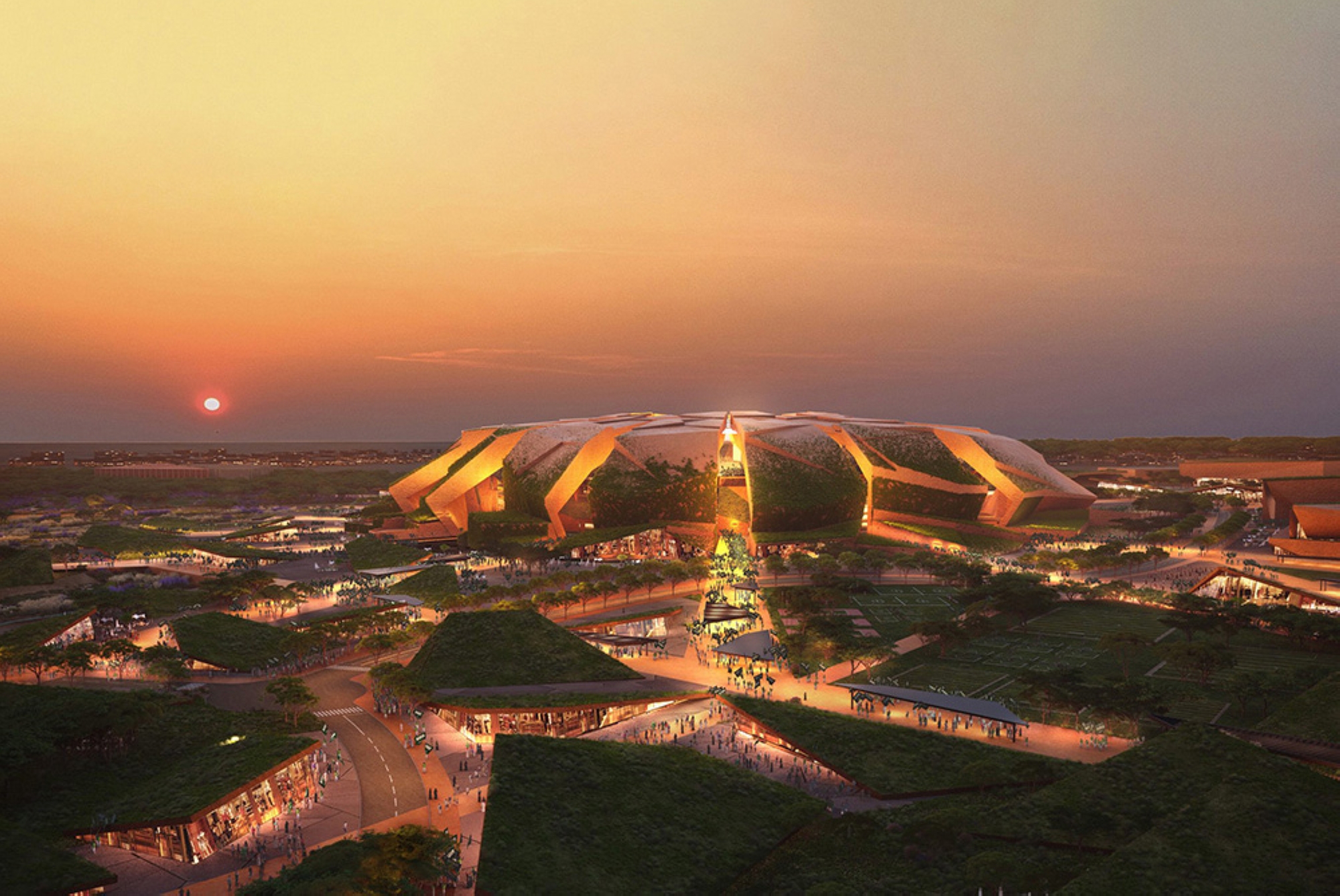
King Fahd International Stadium
This stadium is one of the most prominent stadiums in the region, featuring a roof design inspired by the traditional Arabian tent. It is located near some of the city's top destinations, such as the Sports Corridor project, which will provide easy access to green spaces. The stadium's renovation project will significantly increase its seating capacity and allow it to be used for various purposes, from football matches to music concerts. It will host the group stage, the Round of thirty-two, the Round of sixteen, the quarter-finals, and the semi-finals of the tournament, with a seating capacity of seventy thousand.
Prince Mohammed Bin Salman Stadium
This new stadium is located in Qiddiya, offering a unique view of one of the peaks of Tuwaiq Mountain. The materials used in its construction, including colored glass and shiny metals, give the stadium a distinctive, futuristic aesthetic. With a seating capacity of 46,000, it will host the group stage, the round of thirty-two, the round of sixteen, and the third-place match.
The New Murabba Stadium
The New Murabba Stadium in the capital, Riyadh, will be one of the stadiums hosting the 2034 World Cup, with a seating capacity of over 46,000. It features a design that blends local elements inspired by the Talh tree, one of the key natural landmarks in Wadi Hanifa, with innovation and modern standards.
Roshn Stadium
Roshn Group, a subsidiary of the Public Investment Fund (PIF), announced the construction of an iconic stadium with a capacity of 46,000 spectators, covering a total area of over 450,000 m² in the southwest of Riyadh. The stadium will host the group stage and the round of thirty-two.
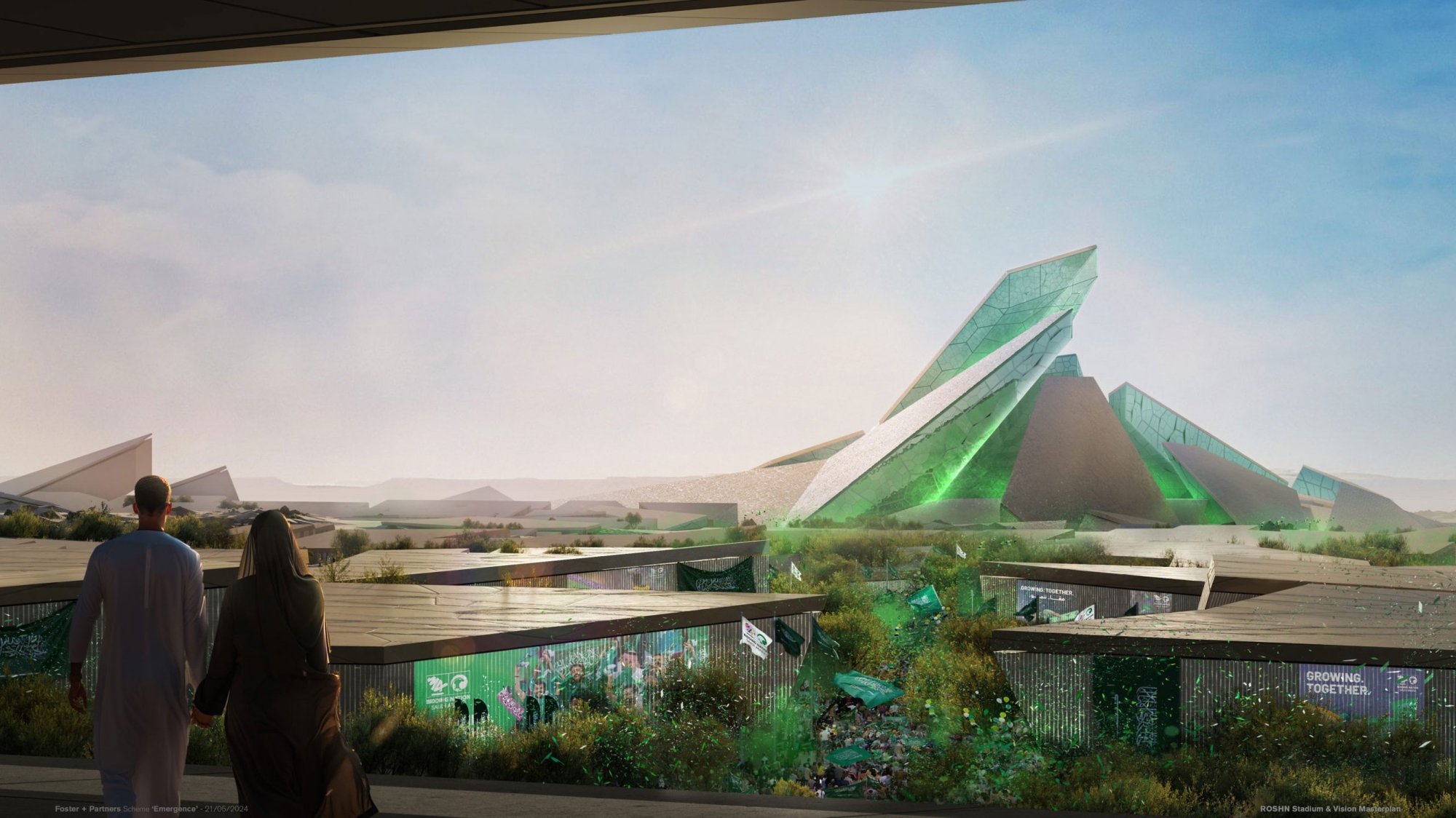
South Riyadh Stadium
The new stadium draws its unique design inspiration from the principles of Salmani architecture, blending the spirit of authenticity, heritage, and modernity. It is set to become the home stadium for one of the football clubs and will host various sporting and entertainment events. The stadium has a seating capacity of 47,000 and will host the group stage and the Round of thirty-two of the tournament.
King Saud University Stadium
This stadium is located in a prime spot next to the "U Walk" complex and is one of the key multi-purpose projects of King Saud University. The stadium currently hosts matches of the Saudi Pro League and other major sporting events. Its capacity will be expanded to accommodate several matches during the 2034 World Cup. With a seating capacity of 46,000, it will host matches during the group stage and the Round of thirty-two of the tournament.
Prince Faisal Bin Fahd Sports City Stadium
This new stadium is set to be built as part of a comprehensive plan that includes several parks and recreational areas in the surrounding region. It will be constructed using locally sourced materials, with a large array of solar panels installed on the roof of the stadium, which is surrounded by multifunctional green spaces. The stadium is located in the heart of a vibrant area, making it a distinctive destination for the local community. It will host group stage matches and the Round of thirty-two in the tournament, with a seating capacity of 46,000 spectators.
King Abdullah Sports City Stadium
Built in 2014, it is known as the "Radiant Jewel." The planned renovation of the stadium aims to meet the requirements set by FIFA while preserving its distinctive design elements. It will host the group stage, Round of thirty-two, Round of sixteen, and the quarterfinals of the tournament. The stadium has a seating capacity of 58,000 seats.
Qiddiya Coast Stadium
This new stadium will be built in the heart of the Qiddiya Coast project on the shores of the Red Sea, alongside several other sports facilities and hotels. The design of the stadium is inspired by the flowing appearance of 'Mexican waves,' with rich and vibrant color gradients. It will host the group stage, round of thrity-two, and round of 16 of the tournament, with a seating capacity of 46,000.
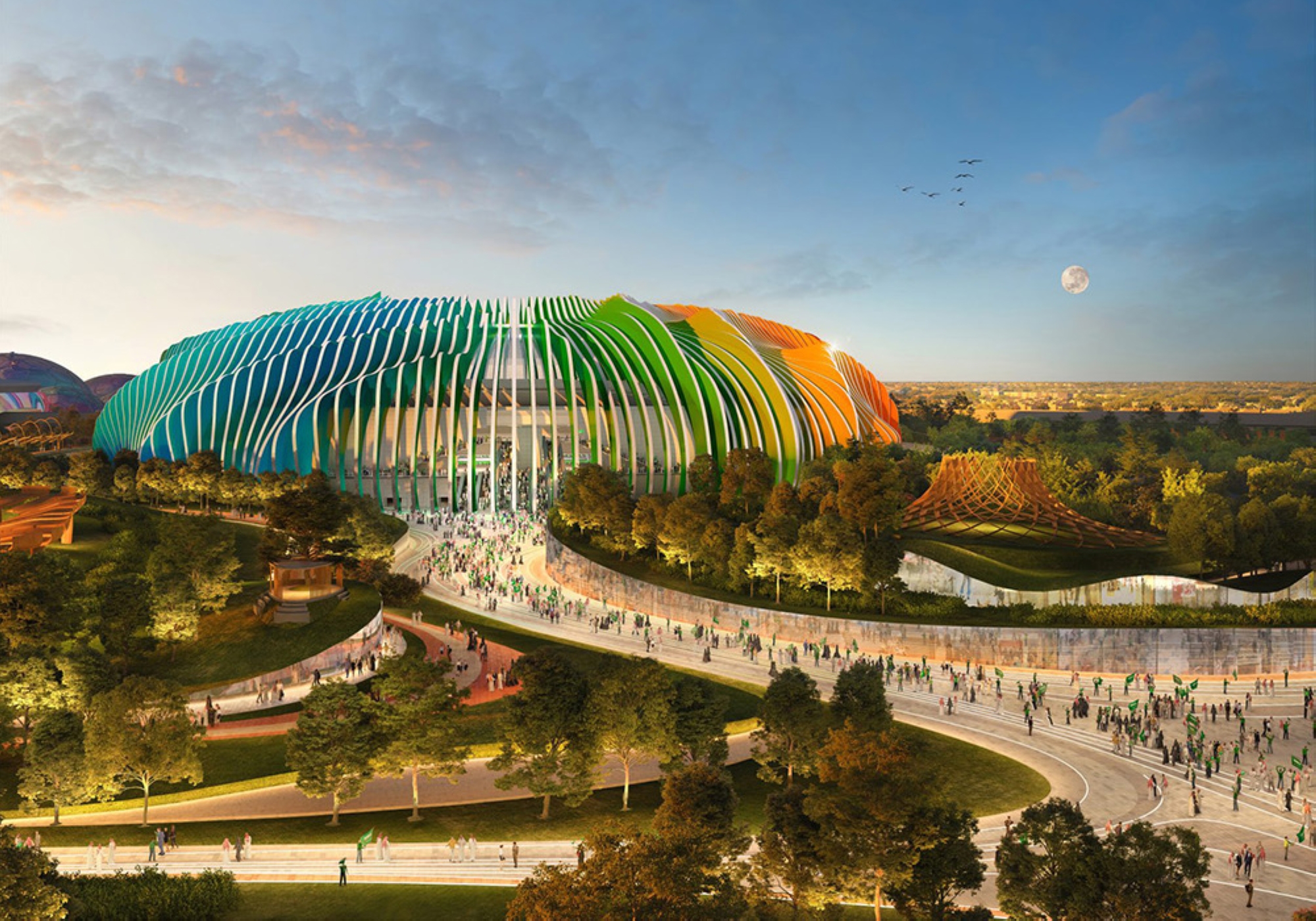
King Abdullah Economic City Stadium
This new stadium is set to be built in King Abdullah Economic City on the Red Sea coast. The stadium features a multi-purpose design with aesthetic touches inspired by the local coral reefs. It will host the group stages and the Round of thirty-two of the tournament, with a seating capacity of 45,000.
Central Jeddah Stadium
The design of the stadium mirrors the distinctive architectural styles of the Historic Jeddah (al-Balad) area, while embracing technological advancements and innovative building designs. The stadium will be located in the sport park area of Jeddah, surrounded by spaces dedicated to fans. The stadium is scheduled to host the group stages and the Round of thirty-two of the tournament, with a seating capacity of 45,000.
Aramco Stadium
This new stadium is located on the Arabian Gulf coast, north al-Khobar, and features a dynamic design inspired by marine vortices. After the World Cup, Aramco Stadium will transform into the main venue for one of the professional sport clubs. It will host the group stages, Round of thirty-two, and Round of sixteen of the tournament, with a seating capacity of 46,000.
King Khalid University Stadium
Located in the southeastern part of Abha, the King Khalid University Stadium is set to undergo expansion to increase its seating capacity to over 45,000 spectators in preparation for the 2034 World Cup. The renovation will focus on modernizing infrastructure while respecting the stadium's historical context. It will host the group stages, Round of thirty-two, and Round of sixteen of the tournament.
Neom Stadium
Neom Stadium is set to be a groundbreaking venue, situated more than 350 m above ground level. Its roof extends as part of the city's structure, offering a unique and extraordinary experience for attending football matches. The stadium will be one of the most iconic landmarks in the world. After the conclusion of the World Cup, Neom Stadium will serve as the home stadium for one of the professional sport clubs and as a center for sport activities and lifestyle programs within the city. It will host the group stages, Round of thirty-two, Round of sixteen, and quarterfinals of the tournament, with a seating capacity of 46,000.
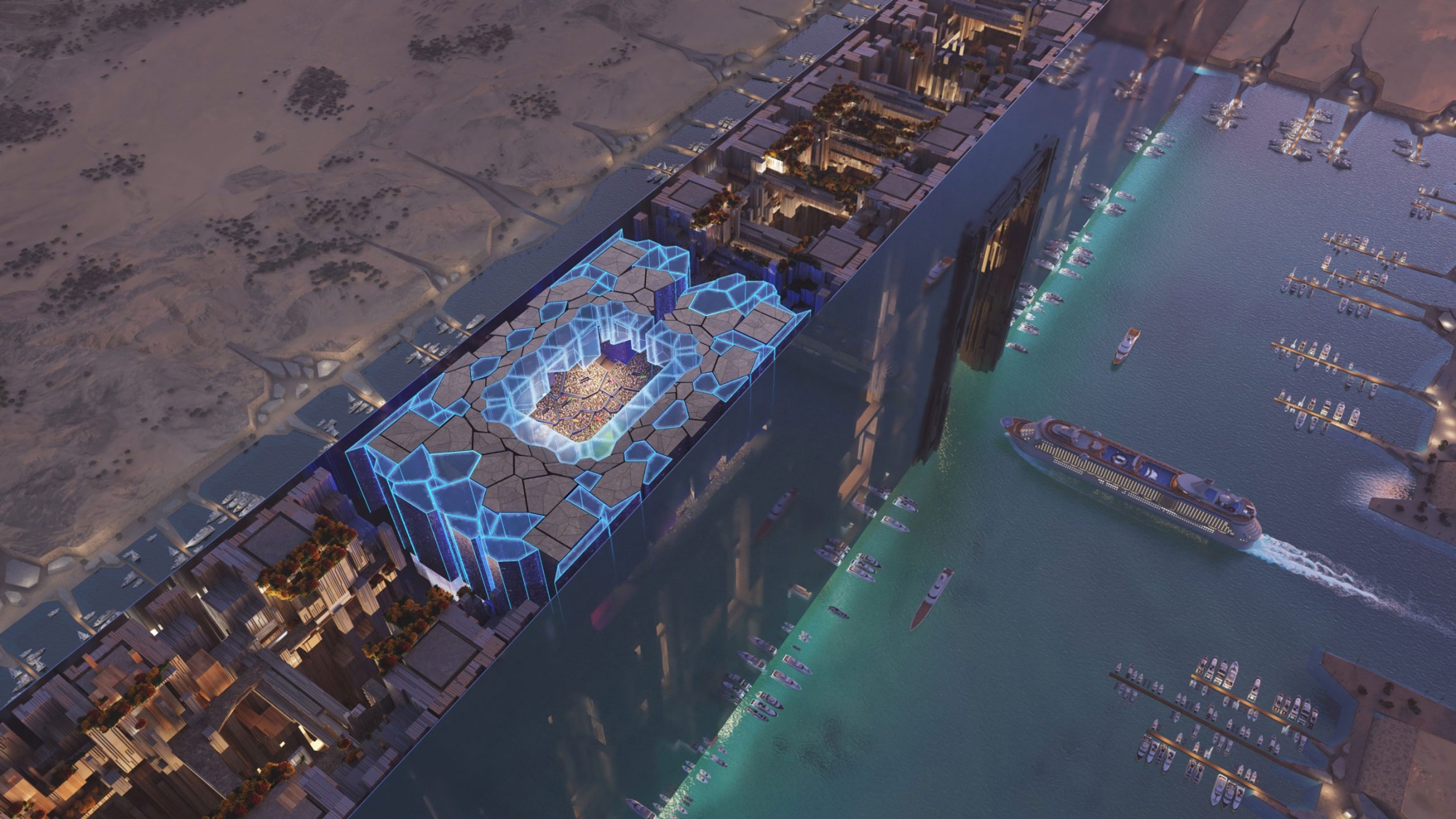
Fan festivals in the 2034 World Cup
The bid file of the Kingdom to host the 2034 World Cup includes ten locations for 'FIFA Fan Festivals' with the aim of providing digital experiences and a festive atmosphere for fans and visitors, reflecting the rich culture and hospitality of the Kingdom. FIFA will select one location in each host city.
Fan festival in Riyadh
The proposed locations in Riyadh for the 'FIFA Fan Festival' include King Salman Park, the largest urban park in the world, and the vast Festival Square in Qiddiya, which fans can access via the Riyadh Metro, consisting of six lines, along with several other transportation options.
Fan festival in Jeddah
Jeddah has an expanded bus network to enable fans around the city to access the proposed locations for the 'FIFA Fan Festival' at al-Khuzama Park as well as at the Jeddah Waterfront.
Fan festival in al-Khobar
al-Khobar has an effective multimodal transportation network that will support the transportation of fans to the proposed locations for the 'FIFA Fan Festival' at King Abdullah Park as well as at King Fahd Park.
Fan festival in Abha
Abha has a comprehensive transportation network, focusing on public transport, light transportation, pedestrian paths, and ease of movement between different areas of the city. This will support the transportation of fans to the proposed locations for the 'FIFA Fan Festival' at al-Bahar Square and al-Dabab (Fog) Park.
Fan festival in Neom
Neom will provide a high-speed train network and advanced electric transportation options to offer a smooth travel experience for visitors to the proposed locations for the 'FIFA Fan Festival,' the marina, and 'The Marina Steps' amphitheater, through a sustainable transportation system connected to the internet.
Hotel accommodation in the 2034 World Cup
The Saudi bid file presented over 230,000 hotel rooms distributed across the host cities and cities supporting VIPs, FIFA delegations, participating teams, media, and fans of the 2034 World Cup. As for the five host cities of the global event, the number of hotel rooms in each will be as follows:
In Riyadh, there will be 127,000 hotel units, while in Jeddah, the number of hotel units will exceed forty thousand. In al-Khobar, it will reach 17,000 hotel units, in Abha, there will be 19,000 hotel units, and in Neom, the number of hotel units will exceed 24,000.
Training centers and stadiums in the 2034 World Cup
In addition to the national teams' training centers, 132 training locations have been proposed in fifteen cities that will host the forty-eight participating teams and their accompanying delegations. This also includes seventy-two stadiums designated for training camps, as well as two training facilities dedicated to referees.
Transportaion between the cities of the 2034 World Cup
The Kingdom offers participating teams, fans, and FIFA delegations the opportunity to benefit from an integrated transport strategy, developed to ensure everyone has an exceptional experience during the tournament. The selection of the five host cities was strategic, aimed at providing fans with the best possible travel experience and enhancing the efficiency of transportation services. The transportation network in the Kingdom offers a wide range of international travel options and local transport services, including air, sea, and land travel, as well as a railway network. The Kingdom has sixteen international airports, along with extensive networks of roads, railways, and public transport buses, enabling swift and efficient travel between various regions.
Organizing global events
The Kingdom is one of the safest countries in the world and has previously hosted more than 100 international sporting events, including the Saudi Arabian Grand Prix for Formula 1 and the 2023 Saudi Pro League World Cup. The Kingdom also organizes the Hajj season, during which it welcomes more than 1.5 million pilgrims in a short period of time. Saudi security forces are among the best-equipped and most successful in the world, and the Kingdom surpasses the global average in many health metrics issued by the World Health Organization.
The contributions of hosting the 2034 World Cup to the development of Saudi football
The development of football in the Kingdom aims to increase the number of players, coaches, and fans, which will be achieved through the Saudi bid to host the 2034 World Cup. This will be supported by a long-term strategy for the development of Saudi football, implemented by the Saudi Arabian Football Federation.
This is through four main areas, which are:
Development of men's football at the Elite Level
It includes:
- Qualifying for the World Cup finals six times.
- Winning the AFC Asian Cup title three times.
- More than 155 countries broadcast the Saudi Pro League matches.
- The average attendance for Saudi Pro League matches reaches twenty thousand fans.
- Over USD 300 in annual investments allocated for the development of football clubs.
- More than fifty international football teams have been hosted by the Kingdom.
- Hosting the 2023 FIFA Club World Cup in the Kingdom.
- The host country for the 2027 AFC Asian Cup.
Development of women's football at the Elite Level
- Significant progress in increasing the interest of women and young girls in playing football.
- Three Leagues for the development of Semi-Professional Football.
- More than one thousand registered female players.
- Seventy thousand young girls in the girls' school football league.
- The establishment of the Saudi women's national team in 2021, the team's inclusion in the FIFA ranking in 2023, and winning its first title.
- Seventeen women's football academies established since 2021.
Development of youth's football
- More than one hundred schools participating in the talent discovery program.
- More than 170 coaches participating in the talent discovery program.
- More than two hundred thousand players in the school league.
- More than twenty-five regional training centers are planned to be established.
Development of young football talents
- More than 4300 football coaches in 2023, representing a significant increase from seven hundred coaches in 2019.
- Enhancing interest in the game through awareness programs, competitions, and education.
Contributions of hosting the World Cup to environmental sustainability in Saudi Arabia
Environmental sustainability in the Kingdom aims to build a sustainable environmental legacy that will inspire future generations about the importance of the environment. This goal is one of the core pillars of the Saudi bid to host the 2034 World Cup finals, supporting efforts to achieve environmental sustainability and comprehensive development in society. The Kingdom is committed to building a more sustainable future and achieving net-zero goals by 2060, relying on the pillars of the circular carbon economy, emission reduction, reuse, recycling, and removal. Through the Saudi Green Initiative and the Middle East Green Initiative, the Kingdom is working to unite climate action efforts to achieve common goals. The 2034 World Cup will work to minimize potential environmental impacts from the ongoing preparations and hosting of the tournament across sectors such as transport, accommodation, stadiums, infrastructure, waste, and energy. The proposed measures include energy management and efficiency, adopting sustainable construction methods, using sustainable building materials, launching waste management initiatives, and promoting the use of existing infrastructure facilities. Additionally, the Kingdom is committed to highlighting its leadership in the environmental field and building on its current efforts aimed at enhancing sustainability. FIFA's goals include building a football legacy for future generations and creating a tangible positive impact by adopting a responsible approach while preparing to host the tournament, prioritizing sustainability, and minimizing potential environmental impact."
Contribution of the 2034 World Cup to the development of Saudi society
Community development is one of the core goals of the Kingdom's hosting of the 2034 World Cup, through building a sustainable legacy for future generations. Its positive impact goes beyond football to encompass all sectors of society. The Kingdom is committed to continuing its investment in sports, particularly football, as part of its preparations to host the 2034 World Cup, which will enhance many of the values of society, including the following:
- Promoting civic values, community cohesion, and development.
- Providing sports opportunities for participants.
- Discovering the joy of teamwork.
- Commitment to rules, fair play, and mutual respect.
The benefit of the Saudi community from hosting the 2034 World Cup
Hosting the 2034 World Cup will have a significant positive impact on Saudi society, and some of the key benefits include:
- Training centers, both existing and planned for construction, will be made available for use by all football players in the Kingdom after the tournament.
- Large investments in sports facilities will contribute to the development of football at all levels, including amateur players and youth.
- Development of professional football clubs in the Kingdom.
- Growth of women's football and football for both young men and women.
- The increase in the number of sports facilities will lead to greater participation in sports activities in general, and football in particular.
- It plays a key role in the government's efforts to enhance community health and quality of life in the Kingdom, which is itself a major goal of Saudi Vision 2030.
Development of the local and international communities
Investments and sports facilities will enhance the Kingdom's international relations through the following:
- The Saudi Arabian Football Federation's commitment to developing football and providing more promising opportunities at both the regional and international levels.
- The Saudi Arabian Football Federation will establish a research institute dedicated to enhancing exchanges and development in football.
- The World Cup will attract participants and fans from all over the world to the Kingdom.
- Local communities and businesses will reap significant economic benefits due to the increasing number of visitors to the Kingdom each year.
- The development of infrastructure and stadiums will have indirect positive effects that will contribute to boosting the local economy and improving quality of life.
Job opportunities for Saudis in the 2034 World Cup
Hosting the 2034 World Cup in the Kingdom will provide numerous job opportunities for Saudis, both men and women, throughout the preparation journey, during the tournament, and after it. These opportunities will be in sectors such as hospitality, restaurants, cafes, tourism, infrastructure, and transportation.
The bid will also provide significant economic opportunities for both local and international companies, as well as for individuals in the community. In addition to the direct benefits of organizing the global event, this will generate promising job opportunities in various fields. The Kingdom has seen a significant increase in volunteer activities since the launch of Saudi Vision 2030, with the number of volunteers rising from 23,000 in 2015 to 834,000 in 2023. The 2034 World Cup will contribute to providing more opportunities for volunteers throughout the hosting period, helping to strengthen social bonds, enhance volunteer skills, and refine the capabilities and experiences of the younger generation.
The economic return from hosting the 2034 World Cup
Hosting the global event will have a significant economic return, as the Kingdom adopts a comprehensive strategy to provide jobs in the private sector, public sector, volunteer work, and attract investments in tourism, hotels, hospitality, infrastructure, and the transportation sector. Job opportunities will be particularly available for Saudis, both men and women.
The stadium hosting the opening and final matches of the 2034 World Cup
King Salman International Stadium is the venue that will host the opening and final matches of the 2034 World Cup, as revealed by FIFA in the details of the Saudi bid to host the largest-ever edition of the World Cup to be organized in a single country. The design of King Salman Stadium was announced to be one of the world’s major sports stadiums, with a total area of approximately 660,000 m², including sports facilities, and a seating capacity of around 92,000 seats. It is expected to be completed by the fourth quarter of 2029.
The stadium’s main stand includes a royal box with 150 seats, 120 hospitality suites, three hundred VIP seats, and two thousand seats for important figures. The stadium features sustainable cooling systems for the audience seats and the pitch. Additionally, the top of the stadium is surrounded by screens extending internally for the fans, along with indoor gardens and a walking track on the roof with a view of King Abdulaziz Park.
The overall plan for King Salman Stadium includes several surrounding sports facilities, covering an area of more than 360,000 square meters. Notable features include two training fields, fan zones, an indoor gymnasium, an Olympic swimming pool, a track and field stadium, and outdoor courts for volleyball, basketball, and padel, to support various sports activities. These facilities are connected by a nine-m²-long sports track around the perimeter of King Abdulaziz Park
FIFA's visit to inspect the cities and projects for the 2034 World Cup
In October 2024, the official delegation of FIFA conducted a tour to inspect the details of the Saudi bid to host the global football event. The delegation visited the host cities, the projects, and sports facilities included in the bid and reviewed the comprehensive plans and preparations for the Kingdom to host the global football event, with forty-eight national teams participating in a single country for the first time in history.
FIFA's evaluation of Saudi Arabia's bid to host the 2034 World Cup
FIFA awarded the Saudi bid to host the 2034 FIFA World Cup a score of 419.8 out of 500, which is the highest technical rating ever given by FIFA to a bid for hosting the World Cup. This achievement represents a new milestone for the Kingdom, reflecting the country's leadership role and the exceptional transformation it is experiencing in the sports sector, in line with the clear and comprehensive goals set by Saudi Vision 2030.
The highlights of the FIFA report on the evaluation of the Saudi bid are as follows:
- The Saudi bid received 419.8 points, the highest rating in World Cup history.
- The healthcare system in the Kingdom is globally leading at all levels.
- The Kingdom enjoys advanced global communication and internet services, making it a leader in providing such services worldwide.
- The Kingdom is fully prepared in terms of hotels, hospitality, and transportation, with the Riyadh Metro connecting all the host stadiums in Riyadh to facilitate fan access.
- King Salman Stadium met three times the compliance requirements, earning twelve points, while the required standard was four points.
- The Saudi 2034 bid fully commits to sustainability and meets all FIFA's basic requirements, which only a few countries, including the Kingdom, can fulfill.
- The Kingdom fully adhered to the FIFA deadlines for bid submission and met all the hosting conditions.
- The locations selected by the Kingdom for the FIFA Fan Festival and the International Broadcast Centre meet all FIFA’s criteria and standards.
- The required number of stadiums for the World Cup is fourteen, but the Kingdom included fifteen stadiums in its bid, all of which meet FIFA's requirements.
- We are working closely to choose a date that suits the country in all aspects, considering important times for the Kingdom such as Ramadan and the Hajj season.
- The Kingdom is capable of inspiring the world with an amazing hosting of the biggest sporting event.
- The Saudi bid to host the World Cup aligns with its ambitious vision, which inspires people.
- Hosting the World Cup in the Kingdom will create an impact and inspire other countries.
- The Kingdom's high ambition is built on innovation, and we believe in this great ambition.
World Cup 2034 by the numbers
Riyadh
Number of host stadiums: Eight stadiums.
Number of training facilities: Fifty-four facilities.
Number of hotel units: 127,000 hotel units.
Proposed FIFA Fan Festival locations: Two locations, namely Qiddiya and King Salman Park.
Jeddah
Number of host stadiums: Four stadiums.
Number of training facilities: Thirty facilities.
Number of hotel units: Forty thousand hotel units.
Proposed FIFA Fan Festival locations: Two locations, namely Jeddah Waterfront and al-Khuzama Park.
Al-Khobar
Number of host stadiums: One stadium.
Number of training facilities: Twelve facilities.
Number of hotel units: 17,000 hotel units.
Proposed FIFA Fan Festival locations: Two locations, namely King Abdullah Park and King Fahd Park.
Abha
Number of host stadiums: One stadium.
Number of training facilities: Nine facilities.
Number of hotel units: 19,000 hotel units.
Proposed FIFA Fan Festival locations: Two locations, namely al-Dabab (Fog) Park and al-Bahar Square.
Neom
Number of host stadiums: One stadium.
Number of training facilities: Four facilities.
Number of hotel units: 24,000 hotel units.
Proposed FIFA Fan Festival locations: Two locations, namely the Marina and The Marina Steps.
Related quizzes
Related articles

